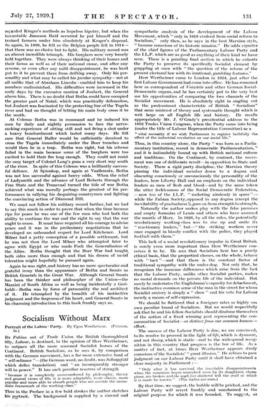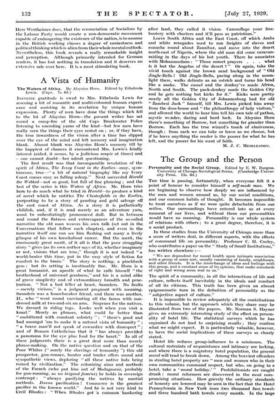Socialism Without Marx
Portrait of the Labour Party. By Egon Wertheimer. (Putnam. 5s.) By Fabian out of Trade Union the British thoroughbred
filly, Labour, is destined, in the opinion of Herr Wertheimer, to outpace all the more seasoned Socialist horses of the Continent. British Socialism, as he sees it, by comparison with the German movement,.has a far more extensive fund of "self-reliance "—(the German word, no doubt, was Selbstgefithl which defies translation) and " an incomparably stronger will to power." It has such peculiar reserves of strength
" because it is completely unencumbered by philosophy, theory and general views of life, it is more adaptable, more elastic, more popular and more able to absorb people who are outside the imme- diate framework of the working-class."
Thus in the Preface in a few bold strokes the author sketches his portrait: The background is supplied by 'a 'shrewd and
sympathetic analysis of the development of the Labour Movement, which " only in 1918 evolved from social reform to Socialism," only then, as he says in the best Marxian style, " became conscious of its historic mission." He adds vignettes of the chief figures of the Parliamentary Labour Party and the I.L.P. which are as good as anything of their kind we have seen. There is a puzzling final section in which he exhorts the Party to preserve its specifically Socialist element by grappling at once with " the question of the reform of' the present electoral law with its irrational, gambling features."
Herr Wertheimer came to London in 1924, just after the first Labour Government had come into office. He has remained here as correspondent of Vora:arts and other German Social- Democratic organs. and he has certainly put to the very best use his opportunities of comparing the two channels of the Socialist movement. He is absolutely right in singling out as the predominant characteristic of British " Socialism" that same mistrust of theory and systematic thought which is writ large on all English life and history. lie recalls appropriately Mr. J. O'Grady's presidential address to the 1892 Trades Union Congress, when the Party came into being (under the title of Labour Representation Committee) as a
" vital necessity if we wish Parliament to register faithfully the effect of the industrial revolution on our social life."
Thus, in this country alone, the Party " was born as a Parlia- mentary institution, reared in democratic Parliamentarism," and it is indissolubly bound up with British national culture and traditions. On the Continent, by contrast, the move-
ment was one of deliberate revolt—in opposition to State and Society. There a rigid party discipline, the Marxian theory pinning the individual member down to a dogma and
obscuring consciously or unconsciously the personality of the leaders, here Liberty Hall and an emphasis on the individual leaders as men of flesh and blood—and by the same token the utter fecklessness of the Social Democratic Federation, —now too of the I.L.P. " rocketing aimlessly in space"—
while the Fabian Society, opposed to any dogma (except the inevitability of gradualness !), goes on from strength to strength.
Naturally the author makes play with the false premises and empty formulas of Lenin and others who have assumed the mantle of Marx. In 1926, by all the rules, the potentially revolutionary working-class was to rise up and smite its " reactionary leaders," but—" the striking workers never once engaged in bloody conflict with the police, they played football with them."
This lack of a social revolutionary impulse in Great Britain is surely even more important than Herr Wertheimer con- ceives it to be. He sees that Socialism here has a purely ethical basis, that the propertied classes, on the whole, behave with " tact "—and that there is the constant factor of traditional sympathy with the under-dog. Not only that, he recognizes the immense differences which arise from the fact that the Labour Party, unlike other Socialist parties, makes no moral demands on the private life of the individual. But surely he underrates the Englishman's capacity for detachment, the instinctive common sense of the man in the street for whom Socialist oratory is simply a " show " and his vote for Labour merely a means of self-expression.
We should be flattered that a foreigner rates so highly out own peculiar brand of Socialism. But we would respectfully ask that he and his fellow-Socialists should disabuse themselves of the notion of a fixed winning post representing the con- summation of Socialist—as distinct front our common human—
effort.
The success of the Labour Party is due, we are convinced, to its resolve to proceed in the light of life, which is dynamic, and not theory, which is static—and to the widespread recog- nition in this country that progress is the law of life. As a matter of fact, at times Herr Wertheimer appears dimly conscious of the Socialists' " great illusion." He refuses to pass judgment on our Labour Party until it shall have obtained a clear majority in Parliament :—
" Only after it has survived tho inevitable disappointments when the messianic hopes nourished even by its doughtiest cham- pions, are broken and the myth lies shattered will the stuff of which it is made be known " (The italics are ours.)
By that time, we suggest, the bubble will be pricked, and the Labour Party will revert frankly and unashamed to the original purpose for which it was founded. To sugmi'st, as Herr Wertheimer does, that the renunciation of Socialism by the Labour Party would create a non-democratic movement capable of endangering the existence of the nation, is to assume in the British working classes a degree of earnestness and political thinking which is alien from their whole Mental outlook. Nevertheless, this book reveals a really remarkable insight and perception. Although primarily intended for German readers, it has lost nothing in translation and it deserves an extensive sale over here. It is a most stimulating book.



































 Previous page
Previous page